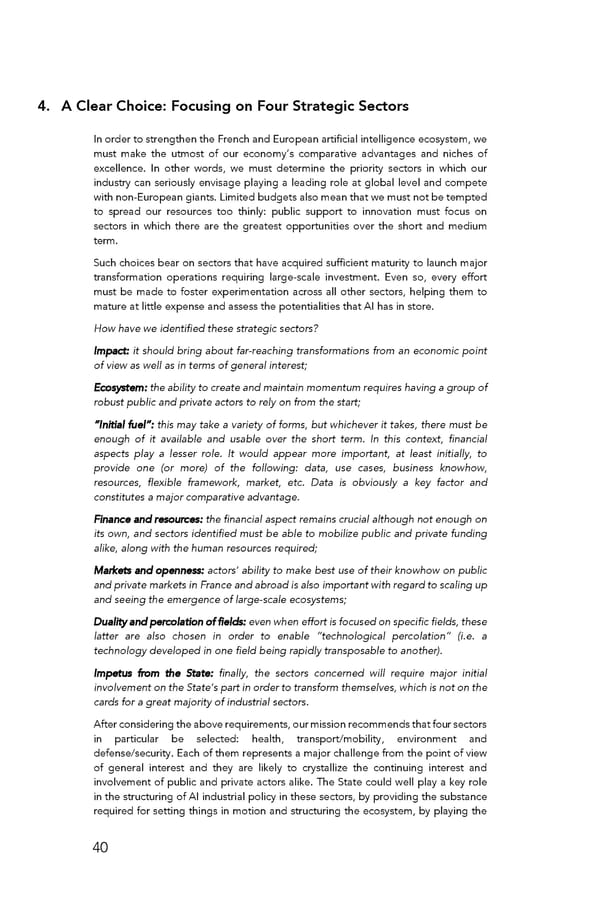4. A Clear Choice: Focusing on Four Strategic Sectors In order to strengthen the French and European artificial intelligence ecosystem, we must make the utmost of our economy’s comparative advantages and niches of excellence. In other words, we must determine the priority sectors in which our industry can seriously envisage playing a leading role at global level and compete with non-European giants. Limited budgets also mean that we must not be tempted to spread our resources too thinly: public support to innovation must focus on sectors in which there are the greatest opportunities over the short and medium term. Such choices bear on sectors that have acquired sufficient maturity to launch major transformation operations requiring large-scale investment. Even so, every effort must be made to foster experimentation across all other sectors, helping them to mature at little expense and assess the potentialities that AI has in store. How have we identified these strategic sectors? Impact: it should bring about far-reaching transformations from an economic point of view as well as in terms of general interest; Ecosystem: the ability to create and maintain momentum requires having a group of robust public and private actors to rely on from the start; “Initial fuel”: this may take a variety of forms, but whichever it takes, there must be enough of it available and usable over the short term. In this context, financial aspects play a lesser role. It would appear more important, at least initially, to provide one (or more) of the following: data, use cases, business knowhow, resources, flexible framework, market, etc. Data is obviously a key factor and constitutes a major comparative advantage. Finance and resources: the financial aspect remains crucial although not enough on its own, and sectors identified must be able to mobilize public and private funding alike, along with the human resources required; Markets and openness: actors’ ability to make best use of their knowhow on public and private markets in France and abroad is also important with regard to scaling up and seeing the emergence of large-scale ecosystems; Duality and percolation of fields: even when effort is focused on specific fields, these latter are also chosen in order to enable “technological percolation” (i.e. a technology developed in one field being rapidly transposable to another). Impetus from the State: finally, the sectors concerned will require major initial involvement on the State’s part in order to transform themselves, which is not on the cards for a great majority of industrial sectors. After considering the above requirements, our mission recommends that four sectors in particular be selected: health, transport/mobility, environment and defense/security. Each of them represents a major challenge from the point of view of general interest and they are likely to crystallize the continuing interest and involvement of public and private actors alike. The State could well play a key role in the structuring of AI industrial policy in these sectors, by providing the substance required for setting things in motion and structuring the ecosystem, by playing the 40
 For a Meaningful AI - Report Page 40 Page 42
For a Meaningful AI - Report Page 40 Page 42